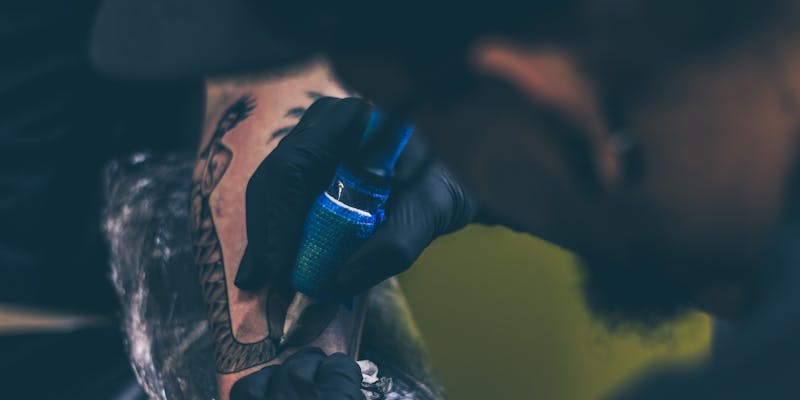If you are thinking about getting a tattoo, there are some important things you should know to keep yourself safe. Tattoos are very popular these days, with many people having them all over their bodies. But sometimes, tattoos can cause problems for your skin. Before you decide to get a tattoo, it's a good idea to learn about some guidelines from the Food and Drug Administration (FDA).
The FDA has received reports of people getting infections or having bad reactions to the ink used in tattoos. So, it's important to ask yourself some questions before you go ahead and get inked. Let's find out more about what you should consider before getting a tattoo.
What To Know About Tattoo Ink?
Depending on the exact ink formulation, tattoo ink is made up of colored liquid combinations that contain pigments, water, and other ingredients. Some tattoo inks may contain colors that are often found in automobile paint or printer toner. Interestingly, no pigments have been approved by the FDA for use as cosmetic injections into the skin.
The FDA keeps an eye out for tattoo ink-related adverse reactions or infections by receiving reports from customers and medical professionals, in addition to data from state agencies in charge of licensing tattoo parlors.
FDA Guidelines for Tattoo Safety
Follow these FDA-approved guidelines for skin safety.
Understand Safe Practices
To prevent possible infections or problems, tattoo parlors must maintain high standards of safety and hygiene. It's crucial to exercise caution when choosing where to get inked because not all tattoo parlors follow the same standards of sterility and hygiene.

It is essential to devote time to learning about safe and hygienic procedures, such as correctly sterilizing equipment and following infection control guidelines. If you decide to get a tattoo, it's important to give preference to places that value hygiene and security. Ultimately, it is highly worthwhile to take additional precautions to ensure your health when it comes to something as permanent as body art.
Scar Tissue Can Be Caused by Tattoos
Your body reacts negatively to tattoo ink because it is a foreign material. Your body's immune system may react by creating scar tissue surrounding the ink, which can result in the formation of tiny knots or mounds called granulomas. These granulomas are a result of your body's attempt to encapsulate and isolate the perceived foreign substance, and they may appear near the tattoo.
A similar reaction to tattooing may also occur in those who are prone to keloids, which are scars that spread beyond the typical bounds of the initial injury site. Tattooing is one of the triggers that can cause keloids, which are formed by the body's overreaction to tissue damage.
Avoid Doing Your Own Tattoo Inks
Using do-it-yourself tattoo kits or inks carries a serious risk to your health and well-being. The FDA claims that these "do-it-yourself" items have been linked to allergic responses and infections. One of the primary worries is that customers might lack the skills or knowledge required to successfully manage and prevent sources of contamination.
Consequently, there is a marked rise in the probability of negative reactions and problems. It is essential to leave tattooing to qualified professionals who follow stringent hygiene guidelines and utilize sterile equipment if you want to guarantee a successful and safe tattooing experience.
Be Aware of Adverse Reactions
It's important to watch out for any unfavorable reactions after getting a tattoo because these could be signs of possible health issues. The FDA states that mild reactions may show up as a fever and rash that includes redness or pimples at the tattoo site. Infections may cause symptoms like chills, shaking, fever, and heavy perspiration in more severe situations.
Moreover, a rash could indicate an allergic reaction, and since tattoos are permanent, it's important to understand that the reaction might last. The FDA suggests obtaining prompt medical assistance from a healthcare provider if you have any alarming symptoms or are unsure about a reaction.
The Long-Term Consequences of Tattoo Ink Remain Unknown
Despite continuous research efforts by the FDA and other organizations, the long-term effects of tattoo ink are still mostly unclear. Concerns about the possible dangers of pigments, extra substances, and impurities in tattoo inks continue to exist. The FDA has received reports of unfavorable reactions to tattoo inks both soon after tattooing and years later, underscoring the need for additional research into their safety.

Additionally, if a person's tattoo ink contains specific chemicals like p-phenylenediamine (PPD), they may become allergic to other items, such as hair dyes. Furthermore, research is currently ongoing on the effects of tattoo removal techniques, specifically with regard to the breakdown of pigments following laser therapy. Although certain removal techniques might leave lasting scars, it's unclear how much of an impact they will have in the short- and long-term.
Tattoo Removal May Be Harder Than You Think
If you're not satisfied with your tattoo, don't rely on the option of removal, as it's not as easy as many people may think. The FDA stresses that getting rid of tattoos can be difficult and painful and that there's no assurance that the ink will come out completely without leaving scars. Permanent scarring could still exist even after several treatments.
Moreover, the short- and long-term effects of using laser therapy to break down tattoo pigments are not entirely known. This ambiguity emphasizes how crucial it is to thoroughly weigh your options before being inked and to be aware of any possible hazards.
The Bottom Line!
Before you decide to get a tattoo, it's really important to think about it carefully. Sometimes, things that seem like a good idea when you're not thinking clearly can turn into regrets later on.
So, take your time and make sure you're making the right choice for yourself. It's better to be safe than sorry when it comes to getting a tattoo.







